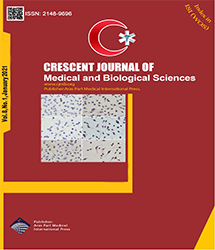
| Original Article | |
| The Effect of Oral Administration of Polyunsaturated Fatty Acids on the Nitrosative Stress of Patients Infected With Helicobacter pylori With Dyspeptic Symptoms | |
| Rasoul Sharifi1, Mohammad Nouri2, Akram Eidi1, Zahra Noormohammadi1, Homayun Dolatkhah3, Masoud Shirmohammadi4 | |
| 1Department of Biology, Science and Research Branch, Islamic Azad University, Tehran, Iran 2Department of Clinical Biochemistry and Laboratories Medicine, Faculty of Medicine, Tabriz University of Medical Sciences, Tabriz, Iran 3Liver and Gastrointestinal Disease Research Center, Tabriz University of Medical Sciences, Tabriz, Iran 4Department of Internal Medicine, Faculty of Medicine, Tabriz University of Medical Sciences, Tabriz, Iran |
|
|
CJMB 2021; 8: 056-060 Viewed : 3894 times Downloaded : 3128 times. Keywords : H. pylori, Nitrosative stress, Dyspepsia, PUFAs |
|
| Full Text(PDF) | Related Articles | |
| Abstract | |
Objectives: Helicobacter pylori is the cause of many stomach diseases such as chronic gastritis, peptic lesion, gastric cancer, and dyspepsia. It is indicated that the process of inflammation is associated with nitrosative stress. Besides, polyunsaturated fatty acids (PUFAs) have strong protective effects against inflammatory diseases, as well as bactericidal effects. Therefore, this study evaluated the beneficiary effects of PUFAs against nitrosative stress in patients infected with this bacterium with dyspeptic symptoms. Materials and Methods: This study was a double-blinded clinical trial and the participants were 34 patients infected with H. pylori with dyspeptic symptoms. The patients were divided into 2 groups, and written consent was obtained from all participants. The control group was treated with a current antibiotic regimen and the case group was treated with an antibiotics regimen and PUFA supplement for 2 weeks. Then, biopsy and juice samples from patients" stomachs were obtained before and after the treatment. The stomach biopsies were used for a quick urease test and juice samples were used via the Griess method for investigating nitric oxide (NO) levels. Results: In gastric mucosa, the mean levels of NO significantly reduced (P < 0.0001) after treatment in the case group (5.36 ± 1.16 mmol/L( compared with the control group (2.72 ± 1.13 mmol/L). Conclusions: The results showed that using omega supplement can improve the nitrosative stress occurred in patients with H. pylori infections and is useful for decreasing NO. Thus, it is suggested that the consumption of omega fatty acids in combination with standard therapy is effective in H. pylori eradication. |
Cite By, Google Scholar
Google Scholar
PubMed
Online Submission System
 CJMB ENDNOTE ® Style
CJMB ENDNOTE ® Style
 Tutorials
Tutorials
 Publication Charge
Medical and Biological Research Center
About Journal
Publication Charge
Medical and Biological Research Center
About Journal
Aras Part Medical International Press Editor-in-Chief
Arash Khaki
Deputy Editor
Zafer Akan


















